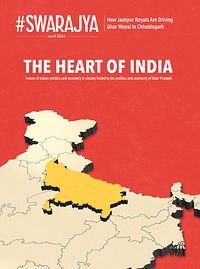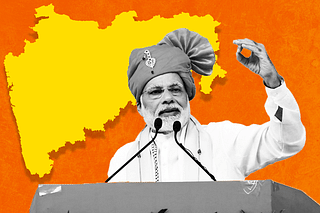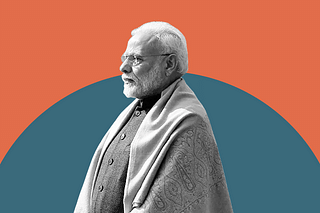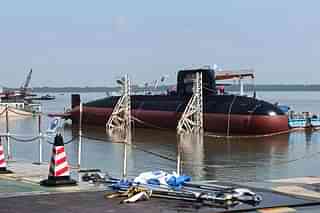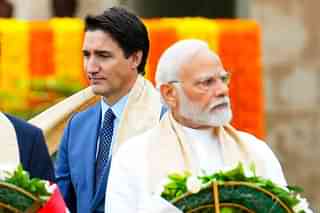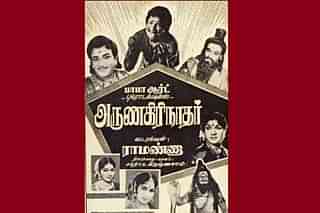Politics
‘Save Lakshadweep’: What’s Going On?
Venu Gopal Narayanan
May 29, 2021, 12:50 PM | Updated 12:50 PM IST
Save & read from anywhere!
Bookmark stories for easy access on any device or the Swarajya app.
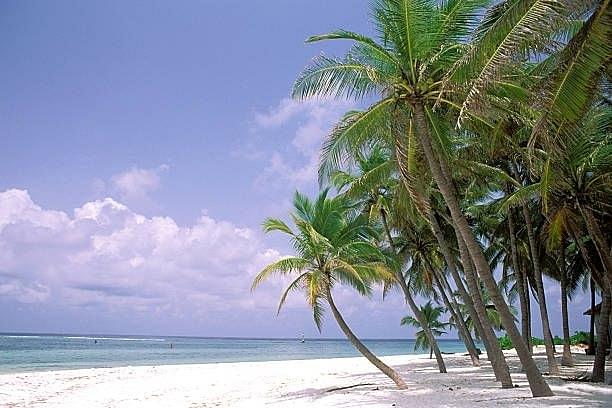
The Chagos Ridge is a long, volcanic feature stretching over 2,000 kilometres from north to south, which neatly divides the Indian Ocean into two.
It hosts a sequence of coral atolls, starting from the Adas Bank, and the American military base of Diego Garcia in the south, through the Maldives archipelago, the Lakshadweep islands, to Pigeon Island in the north, just off the Konkan Coast at Murudeshwar.
The ridge’s geostrategic importance is as primary as the Bab-el-Mandeb straits in the west (linking the Red Sea to the Gulf of Eden), and the Malacca Straits in the east (the gateway to the South China Sea), since half the world’s commerce sails through it.
The Indian Navy maintains various sensitive installations on these island chains, which are never discussed in public. For this reason, even Indian citizens need to take a permit before decamping on holiday, at the luxurious tropical paradise of Bangaram Island in central Lakshadweep.
Readers who have gone scuba diving off Pigeon Island would particularly appreciate the secrecy attached to this ridge, from the trouble it takes to get a diving permit issued by the police station at Murudeshwar, and the sternness with which the local officer instructs divers, to not set foot on Pigeon Island.
So, when a section of our polity abruptly initiates an aggressive new narrative, to make it seem like the Muslims of Lakshadweep are under attack from the Central government, logic demands that we lift the lid to see what lies beneath.
The charge is presently led by the Congress Party in Kerala, along with their allies, and Malayalam mainstream media. It garnered national traction only after the Opposition’s mega farmers’ protest rally in Delhi, scheduled for 26 May, flopped to sink like a stone.
Curiously, the Communists in Kerala initially paid only lip service to this new narrative, with just their Rajya Sabha MP, Elamaram Kareem, condemning the Union government for its 'wicked, wicked ways'.
Since then, though, competitive secularism has caught up with our Marxists. There is now talk of an all-party resolution being passed in the state assembly, and of a 'fact-finding visit' to Lakshadweep by members of parliament.
Multiple accusations have been levied on the Central government in general, and the union territory’s civil administrator, Praful Khoda Patel, in particular.
One, beef has been banned in Lakshadweep. Two, buildings used by fishermen have been heartlessly demolished, causing great loss to livelihood.
Three, the Goonda Act has been invoked, to institute a reign of terror on a peaceful people.
Four, liquor shops and bars are planned to be opened on the islands, in direct contravention of Islamic law.
Five, a law, banning individuals with more than two children from contesting local body elections, is being enacted with the sole purpose of keeping Muslims out of panchayat politics.
Six, locals fear that they will lose their land to a proposed integrated island development plan.
And seven, business may be hit after cargo ships plying to and from Lakshadweep were advised to switch their mainland docking from Beypore, adjacent to Kozhikode on the Malabar Coast, to Mangalore Port.
Early celebrity endorsement of this narrative was provided in an emotional Facebook post, by Malayalee actor Prithviraj Sukumaran, whose cheerful face also endorses India’s first halal-certified, shariah-compliant residential project being built by the Asset group in Kochi.
For wider, graphic effect, a gory poster depicting Patel as a bloodthirsty monster, set to devour the Muslims of Lakshadweep, was circulated online.
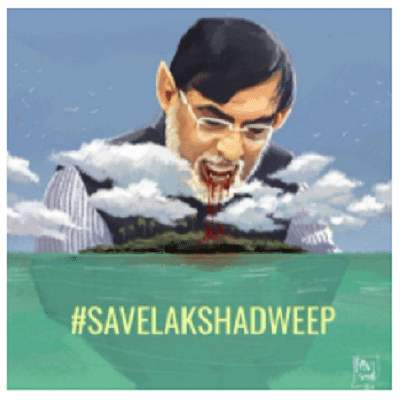
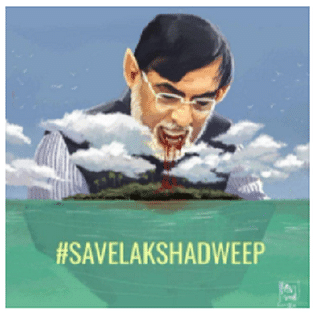
But what’s the truth?
One: beef has not been banned in Lakshadweep. As commentator Shreejit Panikkar clarified with official references, during a Janam TV debate on 27 May, it has only been removed, along with other meats, from the midday meal scheme in schools. What has actually been issued is a draft ‘Lakshadweep Animal Preservation Regulation, 2021’, which prohibits slaughter of bovines. This has gone to court and is under hearing.
One way of looking at the draft is that it is a routine bureaucratic exercise, drawing upon Article 48 of the Constitution’s Directive Principles of State Policy, which encourages governments to formally ban cow slaughter. Or, it is a precursor to the development of Lakshadweep as a major tourist hub, along with the liberalisation of alcohol sales.
Either way, the beef bravado brigade will have something to do once more. Though, they should bear in mind that the more they howl for beef, and against alcohol, in Lakshadweep, the stronger they make the case for gau raksha on the mainland.
And, that every increased decibel will add one more seat to the BJP’s tally, in Uttar Pradesh and the Punjab next year.
Two: Manorama TV broadcast ‘exclusive’ footage on 27 May, of illegal constructions in the tidal zone being demolished, along with an anguished plea from a local, wishing that the administration had built alternative facilities to the illegal ones prior to their demolition.
Read that again if you will: someone actually wants a government body to fund and construct substitutes to unlawful buildings. Now understand the level of entitlement the administration is up against in Lakshadweep.
Three: The Goonda Act has indeed been invoked in the islands, and evidently not a moment too soon. As District Collector Asker Ali, IAS, explained in a press conference in Kochi on 27 May, drug use, domestic violence, and diverse acts of intimidation have been on the rise there, along with, sadly, sexual offences against minors.
Tougher Acts like the Goonda one, and POCSO, have, therefore, had to be invoked, to rein matters in.
One school of thought holds that the POCSO invocation is to deter underage marriages, though this has yet to be confirmed.
Four: Regarding any liquor outlets to be opened on the islands, where prohibition presently exists, a gazette notification of June 2016 clearly states that such matters, if any, would come under an integrated island development plan (to make Lakshadweep a global tourist hub).
Section A(iii) of the notification clearly states that such development would involve consultations with local bodies, and also need to conform to an older island protection zone plan of 2011.
So, any narrative builder accusing an 'evil central government', of bulldozing liquor onto the Islamic character of Lakshadweep, needs to get their facts right before triggering outrages.
Interestingly, this same 2016 notification also includes both a Supreme Court order, and a formal acceptance of the Ravindran Committee recommendations, by which all illegal constructions in Lakshadweep, within 20 metres of the high tide mark, need to be necessarily demolished.
This is the actual legal basis for the demolitions discussed in point two above.
Five: Multiple states of the union have adopted the two-child cutoff for participation in panchayat polls, as part of their broader, generational efforts at encouraging family planning and population control. To position this within the ongoing narrative, as an assault on the culture of Lakshadweep, beggars imagination. However, Advocate PM Niyas of the Congress did precisely this, during his arguments in a debate on Janam TV, on 27 May, to insinuate a nefarious, anti-Muslim, Hindutva hand at work in Lakshadweep.
As other panelists swiftly pointed out, the Congress’ representative sounded like he was either arguing that family planning was un-Islamic, or, that Muslims were naturally disadvantaged by this regulation, because they were unable to hold to the two-child norm.
With supporters like these, who needs foes? And last heard, Niyas was disentangling himself from the Gordian knot he’d wound himself into.
Six: Some land would have to be acquired if major investments in tourism infrastructure are to arrive. But, as section 7(3)(iii) of the ‘draft Lakshadweep development authority regulation 2021’ clearly states, such land acquisition committees would include by law, representatives of local bodies, so fears of steamrolling are unwarranted and needlessly alarmist.
Besides, if large investments are expected, the bigger fight will actually be over who gets to sell, since rising real estate prices would hush all manufactured protests.
Seven: the switch of Lakshadweep’s designated mainland cargo port, from Beypore to Mangalore, is the most significant move of all. Readers must note that this not in the form of an official order from the island’s port and shipping department, but an informal suggestion.
Still, the loudest howls are from the mainland, as this directly affects the export of beef from Malabar to Lakshadweep. But there’s more here, than meets the eye:
In 2013, the Kerala government warned that unregulated sea traffic between the islands and the mainland, through Beypore, was creating an internal security problem.
Since then, the situation has only gotten worse.
In 2019, ISIS terrorists on the run from Sri Lanka by sea, after the Easter bombings in Colombo, were reportedly headed for Lakshadweep. The entire Kerala coast was put on high alert. The same question struck everyone: why would ISIS terrorists think that they could find safe haven in Lakshadweep?
And in March 2021, a multi-thousand crore narcotics haul was effected by a joint team in the Laccadive Sea. According to press reports, the culprit ship received its cargo in a rendezvous off the islands with a Pakistani freighter, which had sailed from Tanzania, to Gwadar, to our waters.
Such goings-on, allied with the fresh heat on Beypore port, mean that the old smuggling routes are becoming increasingly riskier to run. But the ‘Save Lakshadweep’ campaign won’t touch upon any of this.
So, coming finally to the narrative’s core theme of ‘preserving cultural identity’, readers would be dismayed to learn that a bust of Mahatma Gandhi, commissioned well over a decade ago by an administrator, has yet to be installed in Lakshadweep because of strong, local views on idolatry.
Similarly, Golden Jubilee museum on Agatti Island houses statues and figurines of the Buddha, which were unearthed during archeological excavations; the faces have been disfigured a la Bamiyan.
It is this tendency for cultural separatism in Lakshadweep, which is now being further fostered by the new narrative.
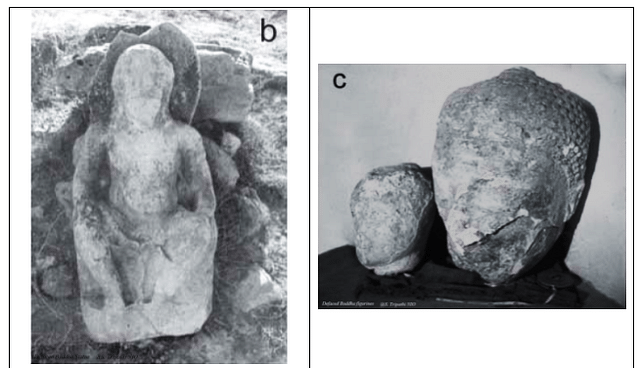
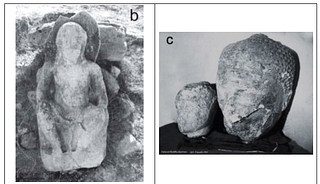
To disregard such unhealthy trends, plus legitimate strategic and developmental issues, and instead drum up invalid alarmism, does neither national security nor the province any good.
Protesters, no matter how well-intentioned, will have to differentiate between genuine threats to cultural identity, and the propagation of cultural separatism, if their outrage is to have meaning.
Otherwise, impartial observers will rightly view it as a smoke screen, and bust the narrative for what it really is — yet one more edition of that standard identity-victimhood ploy, with electoral dividends, which has bedeviled society.
Bottom line: Word on the street is that a long-overdue crackdown is in progress. It’s the cleanup before money starts pumping into the tourism sector. Perhaps, this archipelago in the Arabian Sea was getting a little too Arabian for its own good. In the process, a lot of rice bowls are expected to be broken, especially on the mainland in Kerala, and hence, the new narrative to ‘Save Lakshadweep’.
Save & read from anywhere!
Bookmark stories for easy access on any device or the Swarajya app.
Venu Gopal Narayanan is an independent upstream petroleum consultant who focuses on energy, geopolitics, current affairs and electoral arithmetic. He tweets at @ideorogue.
Introducing ElectionsHQ + 50 Ground Reports Project
The 2024 elections might seem easy to guess, but there are some important questions that shouldn't be missed.
Do freebies still sway voters? Do people prioritise infrastructure when voting? How will Punjab vote?
The answers to these questions provide great insights into where we, as a country, are headed in the years to come.
Swarajya is starting a project with an aim to do 50 solid ground stories and a smart commentary service on WhatsApp, a one-of-a-kind. We'd love your support during this election season.
Click below to contribute.
